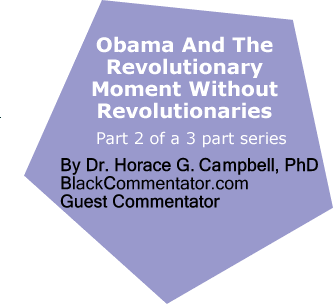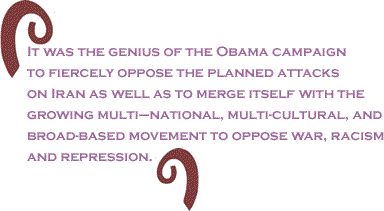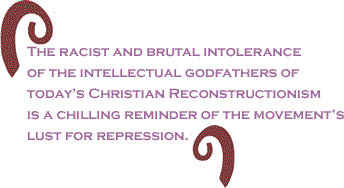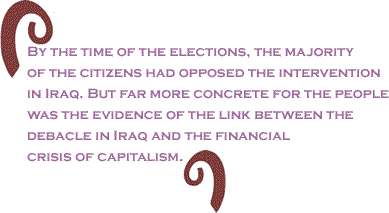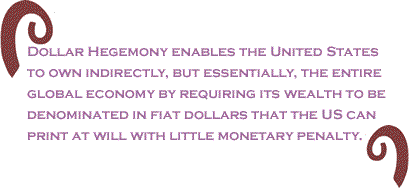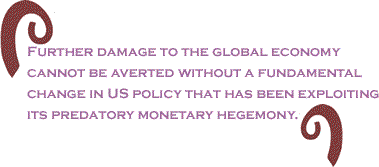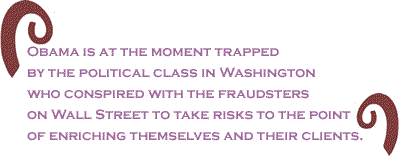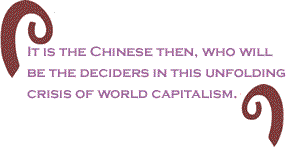
|
|||||||||||||||||||||||

Custom Search
|
|
|
|
|
(Read Part 1, Part 3 of this series) It was the genius of the machinery of hope to inspire the citizens of the USA to rise above the imperial ideas that had been orchestrated during the war on terror. One of the most chilling aspects of this counter-revolutionary period is the way in which the spiritual values of poor and oppressed peoples are being manipulated to the point where poor people of one religious faith can be mobilized to kill peoples of another faith. Hedges captured this militaristic content of Christian fundamentalism when he wrote that,
This lust toward repression had a material base in the society as faith-based marketing and faith-based centers of capital accumulation benefited from the business of selling counter-revolutionary ideals of individualism and greed. These religious zealots in the USA found a common mission with fundamentalists everywhere whether they called themselves Muslim, Hindu, or Jewish fundamentalists. The one common denominator of these fundamentalists was the burning desire to control the bodies and the lives of women. Hence, even while there are disagreements between (say) Islamic and Christian fundamentalists, they both agree that women should not have control over their lives. Homophobia of an aggressive type also flowed from the same fountain of religious and sexual intolerance. At the height of the Civil Rights revolution, leaders such as Huey Newton and the Black Panther Party noted that gays and lesbians were the most oppressed in US society. Behind the language and discourse of compassionate conservatism, a dangerous brand of persecution was orchestrated by the Christian fundamentalists who branded homosexuality ‘as a disease and condemns it as a threat to the family, the health of the nation and Christianity.’, (Christian Fascism page 96). Ignorance and persecution affected the social and spiritual health of the society as homosexuals were castigated as the purveyors of sin and disease. Obama’s campaign for change had joined the wave of the movement for peace at a moment when the US capitalist class was embarking on a strategy to extend the war against the peoples of Iraq to a wider war against the people of Iran. It was the genius of the Obama campaign to fiercely oppose the planned attacks on Iran as well as to merge itself with the growing multi–national, multi-cultural, and broad-based movement to oppose war, racism and repression. It was here that the Obama campaign was learning from the lessons of the Civil Rights movement while understanding that the multi racial and broad based movement was necessary to oppose counter revolution. During the 2008 election campaign, the crisis of capitalism (which was at that time being called the sub prime crisis), brought out millions who were eager to see change. Senior citizens who lost their pensions were very active. Home owners who were losing their homes were searching for support from the government. It was in the black communities devastated by unemployment, the absence of health care, the prison like conditions of many communities, along with the actual extension of the private and public prison system where the Obama campaign received its greatest support. Youths of all races and all classes were the motor of this call for change. They were trapped in an educational system rooted in eugenics and built on the ‘culture of despair.’ It was an educational system suited for robots and was not geared to produce critical citizens. The response of the ordinary workers, farmers, soldiers and cultural artists to Obama campaign was that many of the working peoples were looking for spaces of hope, spaces of truth and spaces of peace. Deepening of the capitalist crisis and the end of the Wall Street Boom While the full blown eugenics drive remain hidden behind the walls of research laboratories, in the midst of the campaign for the election of the Presidency of the United States, the full implications of counter-revolution had been becoming clearer to the citizens. By the time of the elections, the majority of the citizens had opposed the intervention in Iraq. But far more concrete for the people was the evidence of the link between the debacle in Iraq and the financial crisis of capitalism. The End of the Wall Street is the appropriate title of one of the many exposures of the financial fictions that had been conceived to maintain the US capitalist system at the top of the international system. Less than fifteen years earlier James B. Stewart of the Wall Street Journal had written on the extent of fraud and corruption on Wall Street in his book, The Den of Thieves. However, the same public relations machinery of the neo-conservatives had been set in motion to blur the memory of the theft of billions by the junk bond experts. By the early twenty first century the Junk bond experts had been replaced by the derivatives managers and those who conjured new instruments called collateral debt obligations and credit default swaps. Michael Lewis’ exposition on the End of Wall Street was but one of the many that have been coming from the mainstream press on the schemes to transfer wealth from the unorganized working classes to the capitalist class in the USA. What Lewis and so many of the commentators have failed to do is to spell out the real impact of the end of the dollar as the currency of world trade.
In the New York Times one can find a blow by blow account of the crisis of capitalism in an account of “10 weeks of financial turmoil.” When the US government was forced in November 2008 to inject more than US $45 billion into Citigroup, the largest financial services organization in the world, it became clearer to millions that the crisis of capitalism was not simply a cyclical downturn but a fundamental shock to the old forms of US financial hegemony. This author would like to commend this blow by blow account in so far as the bare details of the gymnastics to save the entire financial system was played out from the fall of Lehman Brothers in September to the massive intervention to save Citigroup at the end of November. The stark reality of the depth of the economic crisis of capitalism was being laid bare before the citizens as the Treasury rushed through the Troubled Assets Recovery Program, only to retreat in less than six weeks to seek other band aid measures to save capitalism. What was becoming clear was that the cascading economic crisis could bring down the global system of capitalism. Henry Paulson, the Treasury Secretary, exposed the intellectual shallowness of a class that had bullied peoples all over the world about the virtues of capitalist globalization and the power of financial markets. Paulson turned to Japanese and Chinese capitalists to save US capitalism but it was only the Japanese who would place their national interests after the interests of the United States. Capitalism was in danger and what was previously called a housing crisis was spreading to the ‘so called real economy.’ When this became clearer to the competitors of
the USA in Western Europe, the Central Bankers assured the Bush
administration that the European capitalists would work to save
US capitalism to ensure that the entire system would not collapse.
This assurance was followed by the convening of the meeting of
the group of 20 in Washington on Would the decline of US capitalism be managed with a new global financial architecture to save capitalism? Or would the USA seek to maintain military hegemony in order to attempt the recovery and reconstitution of the old hegemonic form of US capitalism and imperialism? Although Obama had won the elections and was respected all around the world, the leaders of the different regions of capitalism were not willing to allow the USA to be the decisive factor in the future of the international political economy. In most parts of the world there were frantic efforts to seal the end of dollar hegemony. In the words of Henry Liu,
Henry Liu and Michael Hudson are among the rising school of thinkers who understand the depth of the crisis of capitalism and the reality that there must be shift in the mode of economic organization.
Quoting from Henry Liu, one commentator grasped the depth of this crisis in this way,
The regional impact of the international capitalist crisis The incoming Obama administration is faced with reality that “the world economy is faced with crises more serious than any in history.” It is this multi-layered crisis emanating from the counter-revolutionary period that faced the new President and the transition of a candidate that had campaigned on the basis of change. Yet, in the midst of the news of decline and bank failures, Obama turned to the very same architects of the neo-liberal deregulation to be managers of the end of the dollar hegemony. Younger readers will not remember that when the Den of Thieves were most active in the period of Ronald Reagan, Robert Rubin was making his way up the ladder at Goldman Sachs. From Goldman Sachs, Rubin graduated to becoming the Secretary of the Treasury under the neo-liberal administration of William Jefferson Clinton. Robert Rubin has shown his clout with the conservative forces by his survival within the Citigroup and the speed with which the Bush administration was willing to provide billions to keep Citigroup alive. Robert Rubin had left his job as Treasury Secretary under Bill Clinton to Citigroup. He was of the chief supporter of the de-regulation of the financial services industry. After the capitalist depression the US congress had passed the Glass Steagall Act that separated investment banking from commercial banking. This Act was meant to hinder the levels of speculation that culminated in the 1929 crash. Under the leadership of Robert Rubin and conservative neo-liberal legislators, the US Congress repealed the Glass Steagall Act in 1999. The economic team of Timothy Geithner, Lawrence Summers and Robert Rubin represented one wing of the same forces that had strengthened the concentration and centralization of capital over the past twenty-five years. Moreover, Geithner and Henry Paulson had been weaned in the racist climate of the Dartmouth Review during the Reagan revolution when Dienesh Desouza was one of the principal spokesperson of counter revolutionary multi-culturalism. Geithner (Treasury Secretary Designate under Obama) had begun his stewardship in the service of empire under Henry Kissinger at Kissinger Associates and became associated with Lawrence Summers. To inspire confidence in the very forces that precipitated this crisis, the transition team of Obama named insiders such as Larry Summers and Timothy Geithner to top positions in the Treasury and the National Economic Council. By naming Lawrence Summers to be his chief economic adviser, Obama exposed the weakness of a politician who had to turn to the same forces that believed that Africans are inferior. This was the same Summers who in 1991 proposed a memo to the World Bank to the effect that the market value of the lives of persons such as Barack Obama was lower than the market value of the lives of Europeans. This same Summers graduated from his position as an insider for the Clinton administration to becoming the President of Harvard University. From Harvard, Summers exposed his contempt for women when he opined that “innate differences between men and women might be one reason fewer women succeed in science and math careers.” As President of Harvard, Lawrence Summers also “questioned how much of a role discrimination plays in the dearth of female professors in science and engineering at elite universities.” He was later forced to step down by activists who opposed the sexism and racism of this economic adviser for Barack Obama.
Why would Barack Obama, as the agent of change, choose these forces as his economic team? Was this to offer confidence to capitalists internationally? Was Obama trapped inside the capitalist class or was he being a chess player giving these forces room to further expose their own greed and incompetence? It is the view of this author that Obama is at the moment trapped by the political class in Washington who conspired with the fraudsters on Wall Street to take risks to the point of enriching themselves and their clients. While US political scientists waxed on patron client relations in the Third World, future studies on Freddie Mac and Fannie mae will reveal one of the most profound cases of patronage in capitalist societies. Obama on his own (and with the current composition of his economic team) cannot break the feedback loop of corruption, capital accumulation and risk without the active mobilization of the working peoples. The first level of struggle is between the oppressed and the oppressors but there is an on going struggle within the ranks of the oppressor. The intensity of the struggles between different factions of the US capitalist class meant that the debate on the choice of the economic team was compounded by the infighting between factions of the ruling class. Newspapers, television commentators and a new team of commentators emerged in all of the media asking why Lehman Brothers was allowed to fail. It was not clear which faction of the capitalist class was behind the new editorials that called for regulation of derivatives and credit default swaps. Was it Warren Buffet who had warned that these schemes were laying the foundations for a ‘financial tsunami? Whatever the differences between the factions of the rulers, the management of the crisis cannot be left to Barack Obama and the capitalist classes, there must be a revived political force rooted in the revolutionary traditions of the society to ensure that the crisis does not degenerate into new forms of militarism and racism. The problem for these folks is that the rest of the world is not waiting for this internal struggle to be resolved on behalf on one section of the bourgeoisie or another. There are efforts afoot to break the hegemony of the Anglo-Saxon financial system. There are a number of initiatives. The European Dimension of the Struggle Against US Capitalism First, there is the Initiative of the European Union for the EU to be the principal beneficiary of the decline of US imperialism. At the core of this struggle between the Euro and the dollar (the foremost competition of global capitalism today) are the French capitalist classes. Because of the US military occupation of Germany, the German capitalist class is far more reticent about a frontal challenge to the dollar at this historical moment. The French want the Russians in on their plan to be a center against the dollar. Spain is hesitating while Germany is not as bold as France, but for this boldness to become a reality, the French will have to challenge the US militarily and remove the US influence in the Mediterranean. This will mean that France will make deals with Turkey, Saudi Arabia and the North African states for these countries to come under a European military umbrella. President Sarkozy of France is now working overtime to establish this "Union for the Mediterranean" which would only be "complementing and enriching" to existing EU structures France is seeking cultural, political and ideological leadership within the European Union while leading the challenge against the United States. The planning by France is breathtaking, but it will be up to Africans to checkmate this one. Temporarily, the German capitalist class is also hesitating because of the dependence on Russia for energy. Having been invaded twice by European armies in the last century under differing German leadership, the political leadership in Russia is opposed to any scheme that will strengthen European capital. This means that temporarily, Russia would stick to a dead Breton Woods system so that the European capitalists inside the EU are not the beneficiaries of the US financial crash.
The Russians are watching this bold move by France very carefully. In order to wean support from China, the President of France traveled to China to seek an EU/Chinese alliance to confront and weaken Anglo-American financial hegemony. Ever the long term planners, the Chinese made no commitments, except to demand of France not to entertain the Tibetan leadership. Pumped up by its own history, the President of France went on to defy the Chinese by meeting the Tibetan Spiritual leader. Slowly, the Russians have been working with the Chinese to build the Shanghai Cooperation Organization. This is the military/political/economic alliance that would place the Russian and the Chinese in a position to be independent of both the European Union and the United States. The medium term plan of the SCO is for Russia and China to develop trading relations independent of both the Euro and the dollar until that moment when the Chinese financial institutions can compete with the institutions of the Europeans, the British and the United States. The contemporary political leadership in Russia is monitoring the incoming Obama administration very closely to see if the cold war views of the neo-conservatives will also dominate Barack Obama. In the backyard of the USA Secondly, there is the Latin American effort to become independent of US military and economic domination. Led by the financial moguls of Brazil, the capitalist class of Brazil want to benefit from the anti-imperialist work of the World Social forum to build a Third world alliance around Brazil, Russia, India, China and South Africa. One of the principal problems for the Brazilian capitalist classes is that they want to carry forward this leadership of the group of five without fundamental transformation of the traditions of racial genocide in Brazil against the indigenous peoples and the African descendants.
The explicit goal of the Bank of the South is to dethrone the dollar as the dominant currency of Latin America so that dollar hegemony does not drain surpluses from Latin America to the United States. In the past ten years, the democratization processes has isolated the neo-liberal and neo-conservative forces in Latin America who were aligned to the conservative forces in the United States. After fifty years of seeking to isolate Cuba, it is the United States that is now isolated in Latin America. Disparate elements as varied as the farm lobby, the entertainment and hotel industry and children of Cuban exiles are working hard to end the blockade against Cuba. As a politician from Cuba Barack Obama was always aware that it was the black liberation movement that was the most decisive antidote to conservative plans for a military invasion of Cuba. The question of ending the blockade of Cuba is one area where the Obama leadership can be assured that there will be a strong constituency for change in the United States. When the leading capitalist papers in the USA began to call for normalization with Venezuela, it was because of the clarity of the weakness of the military option for the USA to maintain hegemony at this moment.
But unfortunately for the present ruling class in the USA, decline and nationalization of capital in the USA provide a demonstration effect for those social forces in Brazil, Chile and Argentina who are proposing more aggressive state intervention in the economy. This will have severe consequences for US financial institutions in the region. When the cocaine cartel makes a calculation that they will no longer support the dollar, then we know that there is a shift in financial power. It is one of the tasks of the progressive intellectual in the USA to call on the Justice Department of an Obama administration to expose the banks that are at the forefront of the money laundering for the cocaine cartels in Mexico and Latin America. The Japanese and Chinese Dimensions Thirdly, the weak link in this chain of capitalist decline and attempt at recomposition is the Japanese capitalist class. After 60 years of political subservience to the US capitalist system and suffering from US military occupation, the Japanese capitalist class is frightened by the possibility of a lengthy depression. The peace movement in Japan has been emboldened to oppose military occupation and there is now a movement for greater democratization in Japan. The Japanese capitalist class is trapped by its past colonial relations with the other capitalists in Asia and some other Asians are calling on Japan to apologize for the war crimes committed during World War II. As long as the decline in the USA accelerates, Japan will have to develop closer relations with China. The Chinese, who are weaker financially, have a more powerful political system. Slowly it is becoming clearer that the Chinese form of state management of the banking and financial system is superior to the old Wall Street model. Can progressive workers and trade unionists in the United States learn from this form of state management while infusing the older traditions of political accountability and worker engagement to this model of economic management? Will the Obama Presidency inspire the US society to move from the ideas of the consumer led society that supports the capitalists in China who seek to maximize profits regardless of the human and environmental costs? After thirty years of rapid economic transformation, the Chinese economy is also at a crossroad, either a path towards greater capital accumulation and heightened exploitation or a path towards realizing the goals of socialist transformation. It is the Chinese then, who will be the deciders in this unfolding crisis of world capitalism. If the current political leadership in the USA prevails in keeping the Chinese in the dollar hegemony bracket, then the US capitalists can fend off the challenge from France and Germany. Unfortunately, in the week when Citibank was being bailed out, Henry Paulson traveled to China where the US learnt from the head of the Chinese Investment corporation that the Chinese would no longer be supporting the dollar and would be mobilizing their resources for an internal stimulus to support the rebuilding of those parts of China that had been devastated by the earthquake. When one reads the Paulson summary of the discussion with the Chinese leaders, it is clear how “desperate the US financial capitalist class is to keep China playing the game.” US capitalists are more scared now that China largest investor has said no more money to US banks. That cuts off a major source of capital for them. Coupled with the fact that Middle East oil money is also slowing down, because of the falling price of oil, it means the US banks have no place else to go but the US government for money. Here was an unprecedented situation where business persons in the real economy were calling for more state intervention for the revival of US capitalism. Whatever the outcome of the relations between China and the USA, the British pound is nearly finished as an international currency. All of these outcomes will not be determined at the level of finance but at the level of politics. Chinese workers and the Chinese ruling party will have something to say about the future of investments in the USA. Temporarily, the Chinese capitalist class is closely integrated with the US capitalist class, but the internal struggles inside of China have intensified in the face of new manifestations by Chinese workers. If the Chinese capitalist class wins against the workers and crushes other forces, then Geithner and Paulson will have a new lease of life. The IMF will survive and the US can lend themselves money denominated in dollars because there is no challenge to the IMF and the World Bank. But this will be a medium term postponement. The fall of the dollar has taken on its own life and cannot be halted to save the Breton Woods system. In the short term Barack Obama has aligned with the Geitner faction of the financial experts but it is the task of the working class movement an dthe progressive forces to oppose this Geitner/Summers faction of the Obama administration The Middle East and African Dimensions The Middle East and Africa are the weakest link in the chain of international capitalism. This weakness has made this area the scene of the most intense competition between the European Union, China and the United States. In order to weaken the USA, France has proposed a Mediterranean Union to break the power of the United States in the Middle East. The objective of France is to win the oil producing states of this region so that the sale of petroleum on the world market is denominated in Euros instead of dollars. Temporarily, it is not in the interest of Russia and China to support the denomination of the sale of oil in dollars and the cold war between the Euro and the dollar is most intense in the Middle East. France is seeking to benefit from the struggles for self determination in Palestine to challenge the USA in the Arab World.
Farsighted sections of the US capitalist class are watching the unfolding of the French call for a Mediterranean Union with dread to the point where the diplomatic activities of the USA are most intense in this region. The USA is now prepared to support Libya to become the President of the General Assembly of the UN in the next session over the objection of many American allies. From the tactics of the Obama administration, two facts have emerged. Firstly, the elevation of Hilary Clinton to become the Secretary of State is bound up with the struggle between the USA and the EU in the Middle East. It is the calculation of a section of the US capitalist class that it is the Clinton faction of the Democratic Party that can win concessions from the Israeli lobby in the USA when the USA diminishes its relationship with Israel in order to compete with the European Union and China in the Middle East. Conservative militarists in the state of Israel who profited from the Bush fixation with military might overreach themselves as they extended the occupation of the Palestinian lands. A brutal military incursion into the Gaza strip brought out the fact that the Obama Administration had to come up with a changed policy that supports peace in all parts of the Middle East. The second aspect of this chess game is for the Obama administration to bring back the Iranians as allies of the USA. This will require deft political games in Iran and the United States and the basic outlines of this plan is being developed as an alternative to the neoconservative option which was to destroy Iran and weaken Iran economically and politically. The urgency of this rapprochement with Iran has been heightened by the instability generated in the aftermath of the Israeli incursions in Gaza. One positive outcome of this war and the arrogance of the Israeli Prime Minister in his boast on how he ordered George Bush to Vote in the Security Council is that the book by The Israel Lobby and U.S. Foreign Policy, by John Mearsheimer and Stephen Walt can be openly discussed in the period after the Bush administration.
In terms of real resources, both human and material, it turns out that the Europeans, the Chinese and the US covet the wealth of Africa. The long history of plunder and exploitation is now being compounded by the competition between imperial states. African workers, poor farmers and traders watched the campaign of Obama while continuing their search for new levers of control over their resources. They have the assets (in the ground) gold, copper, oil, cobalt, uranium and coltan. They do not have the leverage to turn these assists into real power because their societies are kept divided and weak. But the same crisis that is forcing the banks in the US to come under regulation will force an exposure of the African capitalists who have sent their money to foreign banks. The de-legitimization of the financial services industry along with then weakening of the International Monetary Fund opens a small window for those social forces in Africa who have been opposed to the Washington consensus. These forces are now seeking an international alliance with the working class movement globally. Will the International Labor become more important than the IMF under Barack Obama? This question will be resolved to the extent that the new Labor Secretary becomes a force to support the rights of workers and trade unionists not only in the United States and in the Americas but globally. It is in Africa where the USA seeks to entrench its imperial domination and is planning to mobilize the African descendants in the USA to support the goals of US capitalists in Africa. The plan for the formation of the US Africa Command is but the most overt indication of the forward planning of USA in Africa. It is on the question of Africa where the anti racist and anti imperialist tradition of the black liberation movement requires an understanding of the positive and negative consequences of the election of Barack Obama. Whither India? The last force in this global struggle is the Indian capitalist class. The dream of the Indian capitalist class to become a super power means that the Indian capitalists see themselves as independent of the European Union, the Shanghai Cooperation organization and the Brazil, Cuba, Venezuela force. One of the dangers of this class is their vision of military strength and the rise of the ultra-conservative forces inside India. During the counter–revolution period of George Bush, the Hindu fundamentalists had used the war on Terror to build up hysteria to place India on a war footing. In the recent attacks on Mumbai, the Indian ruling classes have sought to use this outrage to build up the militaristic call for war with Pakistan. War between Pakistan and India is at the front of a very delicate international situation that could engulf the USA, China and Russia, complicating the failed efforts of imperialism to dominate the peoples of Afghanistan. Under the Bush and the conservatives the nationalists in India were being supported in order for India to emerge as a strategic counter weight to Chinese economic and political influence. It is in the interests of the Obama administration to work with democratic forces in India (Read Part 1, Part 3 of this series) BlackCommentator.com Guest Commentator, Dr. Horace Campbell,
PhD, is Professor of African American Studies and Political Science
at |
|
Any BlackCommentator.com article may be re-printed so long as it is re-printed in its entirety and full credit given to the author and www.BlackCommentator.com. If the re-print is on the Internet we additionally request a link back to the original piece on our Website. Your comments are always welcome. eMail re-print notice
If you send us an eMail message we may publish all or part of it, unless you tell us it is not for publication. You may also request that we withhold your name. Thank you very much for your readership. |
|
| |
|





























